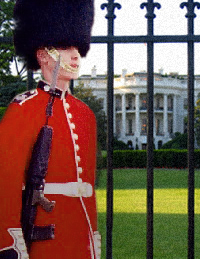Home / War on Terror
by TChris
Writing in Christianity Today, Prof. David Gushee explains why torture is always wrong. He calls on his fellow Christians to stand up to the Bush administration on one of the profound moral issues of our time.
It is past time for evangelical Christians to remind our government and our society of perennial moral values, which also happen to be international and domestic laws. As Christians, we care about moral values, and we vote on the basis of such values. We care deeply about human-rights violations around the world. Now it is time to raise our voice and say an unequivocal no to torture, a practice that has no place in our society and violates our most cherished moral convictions.
(20 comments) Permalink :: Comments
by TChris
Senator Feingold wants the White House to disclose information about its domestic spying so that a meaningful hearing can be held on Feb. 6, when the Senate Judiciary Committee is scheduled to investigate the administration's illegal actions.
Specifically, Feingold asked President Bush to make his staff available to discuss the program, as well as the use of automated data analysis, or "data mining," of domestic communications.
"In addition," Feingold wrote in the letter to Bush, "please provide information about who within the executive branch reviewed, approved or otherwise knew about your authorization of wiretaps in the United States without a FISA order, and when."
The (predictable) response:
The White House suggested it wouldn't meet Feingold's request.
No kidding.
(22 comments) Permalink :: Comments
Siva Vaidhyanathan of Sivacracy is guest posting at Altercation today. One of the issues the NYU prof and media scholar tackles today is feds demanding records of google searches and data-mining.
As many of us have been saying for years, there is real danger in Google (and Microsoft, Yahoo, AOL, Amazon.com, etc.) collecting dossiers on our Internet habits. While these companies might annoy us with targeted ads and please us with customized service, they collect all sorts of information that might or might nor accurately reflect our relative danger to society.
(15 comments, 365 words in story) There's More :: Permalink :: Comments
The Boston Globe today reports on a footnote in Alberto Gonzales' speech:
A footnote in Attorney General Alberto R. Gonzales's 42-page legal memo defending President Bush's domestic spying program appears to argue that the administration does not need Congress to extend the USA Patriot Act in order to keep using the law's investigative powers against terror suspects.
The memo states that Congress gave Bush the power to investigate terror suspects using whatever tactics he deemed necessary when it authorized him to use force against Al Qaeda. When Congress later passed the Patriot Act, Bush already had the power to use enhanced surveillance techniques against Al Qaeda, according to the footnote. Thus, legal specialists say, the administration is asserting that Bush would be able to keep using the powers outlined in the Patriot Act for Al Qaeda investigations, regardless of whether Congress reauthorizes the law.
(8 comments, 295 words in story) There's More :: Permalink :: Comments
Thanks to Glenn Greenwald for pointing out that in 2002, Republican Mike DeWine proposed amending FISA to reduce the probable cause standard for foreigners to one of "reasonable suspicion" and his bill was defeated.
There was good reason for rejecting DeWine's bill. It's called the Fourth Amendment. From an AP article on June 26, 2002 (available on Lexis):
Stephen Saltzburg, a George Washington University law professor, questioned whether courts would view DeWine's proposal as violating Fourth Amendment protections against unreasonable searches.
"Any departure from probable cause when dealing with electronic surveillance warrants will be dealt with extreme skepticism by the judiciary," he said.
The ACLU noted:
....the lower standard would make it too easy for the FBI "to break into a non-citizen's home, download everything in his computer and rifle through everything in his bedroom."
(16 comments, 411 words in story) There's More :: Permalink :: Comments

Update: The New York Times on Bush's planned weeklong spin mission for the NSA program.
****
Original Post
It's happening again. Everytime the Democrats come close to scoring, they drop the ball. They fall for the Republican rhetoric, try to play the middle and end up sounding like Republican-lites.
Here's what you will see in the next few days. All of the points made over Bush's warrantless NSA electronic monitoring program being illegal are about to go down the drain. Scared off by Karl Rove, and Bush's agenda of talking heads this week, the Democrats are now saying they are in favor of increased surveillance just as much as the Republicans. Their opposition is about to be reduced to accusing Bush of a technical violation they would only have been to happy to fix had he asked.
(39 comments, 1159 words in story) There's More :: Permalink :: Comments
Sen. Russ Feingold (D-WI) sent this letter (pdf) to National Intelligence Director John Negroponte, NSA Director Keith Alexander and Donald Rumsfeld today. A snippet:
"One element of the NSA's domestic spying program that has gotten too little attention is the government's reportedly widespread use of data mining technology to analyze the communications of ordinary Americans. Today I am calling on the Director of National Intelligence, the Defense Secretary and the Director of the NSA to explain whether and how the government is using data mining technology, and what authority it claims for doing so.
Data mining is a new, unproven and intrusive technology in the counterterrorism context, and we need to know how it is being used, how effective it is in finding patterns of terrorist activity, and whether there are sufficient safeguards to protect the privacy of Americans. We can and must fight terrorism aggressively without infringing on the privacy of law-abiding Americans."
(6 comments) Permalink :: Comments
Bradblog has the transcript (pdf) of last week's House Judiciary Committee (Democratic) hearing on Bush's warrantless NSA electronic surveillance program. [link fixed]
(1 comment) Permalink :: Comments

Thanks to Suburban Guerilla, Mark Crispin Miller and Save the USA for pointing out Section 605 of the House version of the Patriot Act renewal legislation. It calls for the creation of a Federal Police Force. Your imperial presidency at work.
"A permanent police force, to be known as the 'United States Secret Service Uniformed Division,'" empowered to "make arrests without warrant for any offense against the United States committed in their presence" ... "or for any felony cognizable under the laws of the United States if they have reasonable grounds to believe that the person to be arrested has committed or is committing such felony."
Here is the text to Sec. 605, Creation of the Uniformed Division, United States Secret Service. [hat tip Patriot Daily.]
(22 comments, 485 words in story) There's More :: Permalink :: Comments
Marty Lederman at Balkanization thinks it may be fruitless to get a special counsel appointed to investigate Bush's warrantless NSA electronic surveillance program. But, he has another possible solution:
My friend David Barron has come up with the simple but ingenious idea that Congress should vote for a statute that would confer statutory standing on certain persons to file a cause of action in federal court seeking declaratory relief that the NSA program is unlawful -- say, for example, persons who have a reasonable basis for claiming that they are chilled by the spying program because their employment regularly requires them to make overseas calls in connection with academic or journalistic work related to the war on terrorism.
That way, the Supreme Court could resolve the question. Of course, the President could veto such a bill. But I think there'd be some chance of an override (see, e.g., the overwhelming majorities for the McCain Amendment); and, in any event, presumably such a veto would be politically dicey.
There's more at David Barron's blog, Law and Culture.
(9 comments) Permalink :: Comments
The Guardian makes an important point on the bin Laden tape today, and warns Britain against falling for it. We need to convey the same message to our legislators who will use the tape as renewed fodder for the Patriot Act renewal legislation, increased surveillance and enhanced security measures.
At the heart of Bin Laden's message is the threat to unleash further terror attacks on American citizens in their homeland. Far from provoking a movement to appease the terrorists, this will surely do the reverse. It will play directly into the hands of those who insist that security must overwhelm all other considerations. It should not.
That's just what bin Laden wants, to destroy our democratic freedoms and our civil liberties. We should not give him what he wants.
We must take care that our leaders do not brainwash the public by using Bin Laden's tape as a justification for Bush's warrantless electronic surveillance of Americans or the torture of detainees (or their extraordinary renditions to countries that engage in torture.)
(38 comments) Permalink :: Comments
Raw Story has obtained a copy of the Justice Department memo about to be released vouching for the legality of Bush's warrantless NSA electronic surviellance program.
"The NSA activities are supported by the President’s well-recognized inherent constitutional authority as Commander in Chief and sole organ for the Nation in foreign affairs to conduct warrantless surveillance of enemy forces for intelligence purposes to detect and disrupt armed attacks on the United States," Justice Department lawyers write, referring to the President's order to wiretap Americans' calls overseas.
It adds, "The President has the chief responsibility under the Constitution to protect America from attack, and the Constitution gives the President the authority necessary to fulfill that solemn responsibility."
The full DOJ memo is available here (pdf). The New York Times article is here.
(15 comments) Permalink :: Comments
| << Previous 12 | Next 12 >> |







